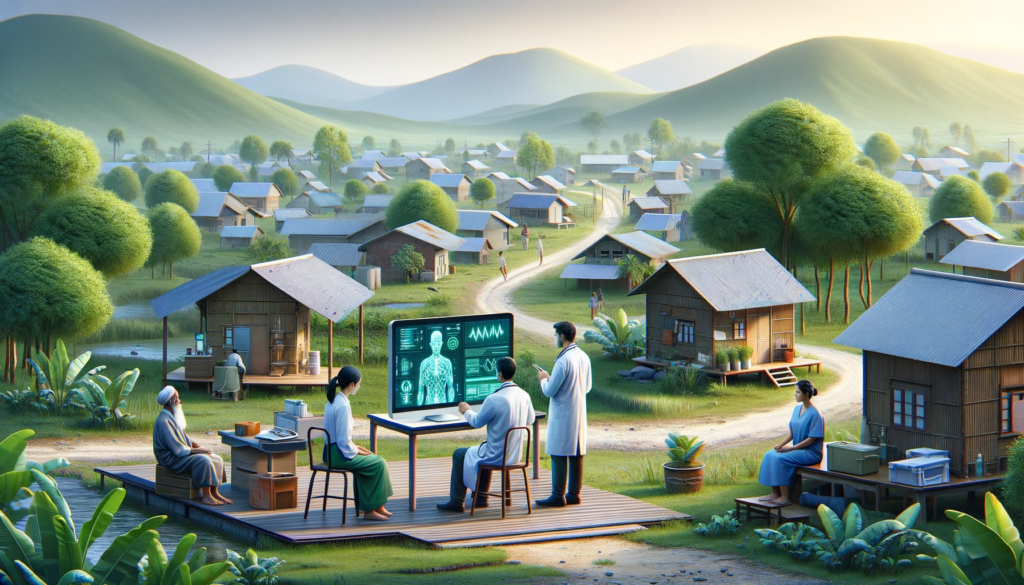In developing countries, access to adequate healthcare can be a challenge due to various factors. However, with the advancements in artificial intelligence (AI), doctors in these regions are now able to provide better care to their patients.
AI technologies are revolutionising the field of medicine by assisting doctors in diagnosing diseases, interpreting medical images, and suggesting personalised treatment plans. By analysing large volumes of medical data and comparing it with existing knowledge, AI algorithms can quickly identify patterns and make accurate predictions. This can be particularly helpful in areas where there is a shortage of experienced doctors or limited access to specialised medical facilities.
As a company based in Vietnam, we have a special interest in ensuring adequate opportunities to everyone, especially those in traditionally underserved areas. Improvements to healthcare spill over into every other sector of the economy and broader society, improving lives by shoring up the most crucial aspect of anyone’s life: health. AI has come a long way, and we’re very happy to see the benefits it can bring to the developing world.
The Challenges Faced by Doctors in Developing Countries


Doctors in developing countries face numerous challenges when it comes to providing healthcare. Limited resources, including medical equipment, trained staff, and access to specialised facilities, make it difficult to deliver quality care. The shortage of doctors and healthcare professionals further compounds these challenges.
The burden on healthcare providers is immense, and the lack of access to up-to-date medical information and research can hinder accurate diagnoses and appropriate treatment plans. However, AI offers a solution to these challenges.
How AI Is Revolutionising Healthcare in Developing Countries
AI tools have the potential to overcome resource constraints and improve healthcare outcomes in developing countries. These tools can analyse medical data, including patient records, lab results, and medical images, to identify patterns and aid in the diagnosis of diseases. By leveraging AI algorithms, doctors can make faster and more accurate diagnoses, leading to timely interventions and improved patient outcomes.
Additionally, AI-assisted treatment and surgery can enhance the precision and effectiveness of medical procedures. AI algorithms can assist doctors in planning surgeries, predicting surgical outcomes, and even performing certain tasks during surgeries. This not only reduces the risk of human error but also enables doctors to provide advanced medical care that may not have been possible otherwise.
AI-Powered Diagnostic Tools
AI-powered diagnostic tools are a game-changer in developing countries where access to experienced doctors and specialised medical facilities is limited. By comparing a patient’s data with a vast database of medical knowledge, AI algorithms can identify patterns and provide insights that aid doctors in their decision-making process.
Furthermore, AI algorithms can continuously learn from new data, improving their accuracy over time. This allows doctors in developing countries to have access to the latest medical knowledge and insights, regardless of their location or limited resources. AI-powered diagnostic tools not only enhance diagnostic accuracy but also enable doctors to provide more personalised and targeted treatment plans for their patients.
Another way AI diagnostic tools can benefit developing regions is by saving doctors and other medical staff time. Whereas medical professionals would previously have to spend hours poring over diagnostics, increasingly accurate AI diagnostics make a doctor’s job much easier. In regions where medical services are already strained, this can be a major relief for doctors. Those doctors can then go on to treat people face-to-face instead of slogging through vast quantities of data and images.
AI-Assisted Treatment and Surgery
AI is not just limited to diagnostic capabilities; it also plays a crucial role in assisting doctors during treatment and surgery. AI algorithms can analyse patient data, medical records, and research papers to suggest personalised treatment plans based on the individual’s unique characteristics and medical history. This enables doctors to provide tailored care to their patients, taking into account factors such as allergies, drug interactions, and potential side effects.
Moreover, AI algorithms can assist doctors in surgical planning and prediction. By analysing medical images and patient data, AI can help surgeons identify the most optimal surgical approaches, predict potential complications, and even guide them during the procedure. This level of precision and guidance can significantly improve surgical outcomes, especially in areas where there is a shortage of experienced surgeons or limited access to specialised surgical facilities.
AI-Driven Telemedicine and Remote Healthcare
Telemedicine and remote healthcare have become increasingly important in developing countries, where access to healthcare services may be limited due to geographical barriers or lack of transportation. AI-powered telemedicine platforms enable doctors to remotely diagnose and treat patients, providing access to healthcare services for those who may not have been able to receive medical attention otherwise.
Through telemedicine platforms, doctors can communicate with patients via video calls, review medical records, and prescribe medications. AI algorithms can assist doctors by providing real-time clinical decision support, suggesting treatment options based on the patient’s symptoms and medical history. This not only improves access to healthcare but also reduces the burden on healthcare systems, allowing doctors to reach more patients in a timely manner.
The Impact of AI on Healthcare Accessibility and Affordability
One of the significant benefits of AI in developing countries is its potential to improve healthcare accessibility and affordability. By leveraging AI-powered tools and technologies, doctors can overcome resource constraints and provide quality healthcare to more people. AI algorithms can assist doctors in making accurate diagnoses and suggesting personalised treatment plans, reducing the need for expensive and time-consuming tests and procedures.
Additionally, AI-driven telemedicine platforms can bridge the gap between doctors and patients, especially in remote or underserved areas. Patients can receive medical advice and prescriptions without the need for physical travel, saving both time and money. This not only improves access to healthcare but also reduces the financial burden on patients, making healthcare more affordable and accessible for all.
Overcoming Barriers to AI Implementation in Developing Countries


While the potential of AI in healthcare is immense, there are several barriers to its widespread implementation in developing countries. Limited infrastructure, including internet connectivity and access to reliable power supply, can hinder the adoption of AI technologies. Additionally, the lack of trained personnel and awareness about AI in healthcare can pose challenges.
To overcome these barriers, collaboration between governments, healthcare organisations, and technology companies is crucial.
Investments in infrastructure development, training programs for healthcare professionals, and public awareness campaigns can help accelerate the adoption of AI in developing countries. Furthermore, partnerships with international organisations and sharing of best practices can facilitate knowledge transfer and support the implementation of AI-powered healthcare initiatives.
Examples of Successful AI Healthcare Initiatives in Developing Countries
Several developing countries have already embraced AI in healthcare and have witnessed positive outcomes. For instance, in India, AI algorithms have been used to detect diabetic retinopathy, a leading cause of blindness. This has enabled early detection and timely treatment, saving the vision of many patients who otherwise would not have had access to specialised eye care.
As another example, in Rwanda, AI-powered drones are being used to deliver medical supplies to remote areas with limited infrastructure. These drones can fly autonomously, avoiding obstacles and delivering critical medications and supplies to healthcare facilities in a timely manner. This has significantly improved the accessibility of healthcare services in remote regions, saving lives and reducing the burden on healthcare workers.
These examples demonstrate the transformative potential of AI in healthcare for developing countries. By harnessing the power of AI, doctors can overcome the challenges they face and provide quality healthcare to those who need it the most.
The Future of AI in Healthcare for Developing Countries
The future of AI in healthcare for developing countries is promising. As technology continues to advance, AI-powered tools and solutions will become more accessible and affordable. This will enable doctors in developing countries to leverage AI algorithms and provide quality healthcare to their patients, regardless of resource constraints or geographical barriers.
However, it is important to ensure that the implementation of AI in healthcare is done responsibly and ethically. Privacy concerns, data security, and the potential for bias in AI algorithms must be addressed to build trust and ensure the integrity of AI-driven healthcare systems.
By embracing AI in healthcare, developing countries can bridge the healthcare gap and offer high-quality medical services to those who need it the most. With the right investments, partnerships, and policies, AI has the potential to revolutionise healthcare delivery and improve health outcomes for millions of people in developing countries.
The future is bright, and AI will undoubtedly play a crucial role in shaping the healthcare landscape for years to come. If you’re looking for a partner to develop AI platforms, you’ll want one with both broad and deep experience in the field. That’s SmartDev. Curious about working with us? Reach out to discuss a project and we’ll get started. The world’s getting faster, and we’re here to help you keep up.



